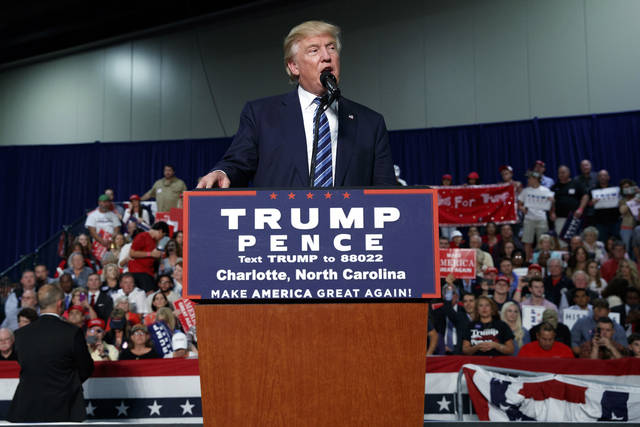CHARLOTTE, N.C. — Charlotte, North Carolina, a Democrat-dominated city whose transgender-friendly bathroom ordinance triggered a statewide political war, is a front-runner to host the 2020 Republican Convention where President Donald Trump seeks an anointing to run for a second term.
Charlotte’s mayor says that would be just fine.
But some local Democratic officials say: Not so fast.
The City Council has scheduled a special meeting Monday to decide whether to accept a yet-to-be-extended offer from the GOP. Published reports suggest Charlotte is favored to land the convention.
In a column for The Charlotte Observer, Mayor Vi Lyles said while the nation is at “a tipping point of incivility,” the city can show its inclusiveness and demonstrate values of respect while honoring differences. Lyles, elected last fall, is the city’s first black female mayor.
Councilwoman LaWana Mayfield, however, said her constituents have expressed concerns based on “the language that comes out of this administration.”
Opponents have cited Trump’s statements denigrating minorities, Muslims, women and the LGBTQ population.
Fellow council member Braxton Winston said in a video that Charlotte should slow down and discuss whether it should pursue the convention. On his Facebook page, Winston said bringing the convention to Charlotte should be more than an economic decision.
“We would be asking the people of Charlotte to host a celebration for a brand of politics that has been highly divisive and some would say dangerous to our community,” Winston wrote.
If Charlotte, North Carolina’s largest city, were to host the convention, the GOP would be visiting a community where it hasn’t fared well against Democrats in the last two presidential elections. President Barack Obama carried Mecklenburg County in 2012 with 60 percent of the vote. Democratic candidate Hillary Clinton won the county over Trump in 2016 with 62 percent of the vote. In 2012, Charlotte hosted the convention that launched Obama’s second run for The White House. North Carolina voted for the GOP in 2012 and 2016 after Obama won the state in 2008.
Charlotte policymakers have also enraged political leaders in the Republican-dominated state.
In 2016, the Charlotte City council expanded a local nondiscrimination ordinance to cover LGBT people. One revision allowed people to choose restrooms corresponding to the gender with which they identify. In response, state lawmakers passed a law requiring transgender people to use public bathrooms that match the sex on their birth certificates. A nationwide backlash against the state law was immediate and fierce. The Republican governor who signed it ended up losing his office.
Still, Lyles says a Republican convention in Charlotte could be a good thing.
Speaking recently to the Democratic Women of Mecklenburg County, Lyles said that while she doesn’t expect to deliver the welcoming address, she said the city’s job is to make sure it’s safe to hold the convention in light of anticipated protests.
“We have to plan a strategy around people being able to exercise their First Amendment rights,” Lyles said. “I can’t speak to what 2020 will bring, but I think each of us is aware of what’s going on in this country. What I would hope is that we would have the ability to showcase what’s right about working together in government here in Charlotte.”
Community activist Jibril Hough fears a GOP convention in Charlotte would amount to a repeat of the 1968 Democratic National Convention in Chicago, where protesters from across the country converged to express objections to the Vietnam war. Demonstrations that turned violent amid confrontations with police were televised to the nation.
“It’s not a typical RNC convention. This is Donald Trump. This is the party of Donald Trump,” Hough said. “I see more than ‘us against them.’ His supporters will be here, so it may end up being some clashes. So there will be safety concerns, no doubt.”
Citizens will have a chance to express their views at the Monday meeting, which is scheduled for 2 p.m.


